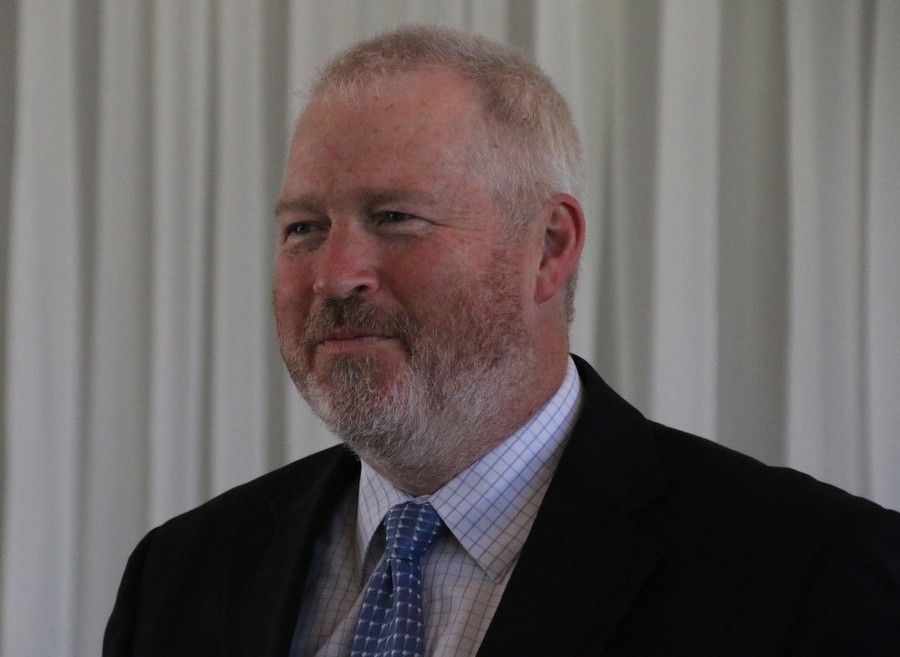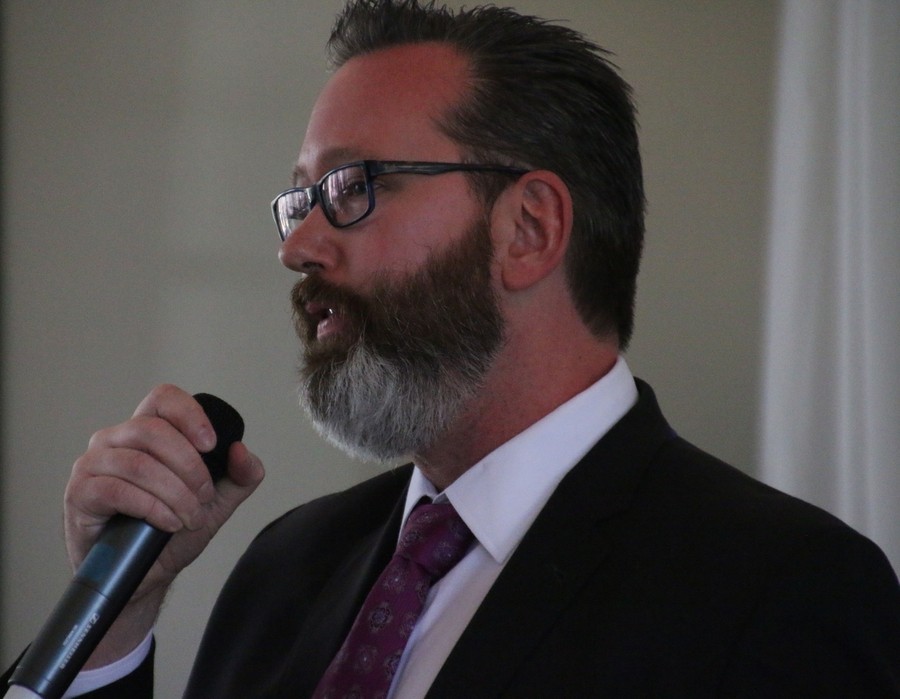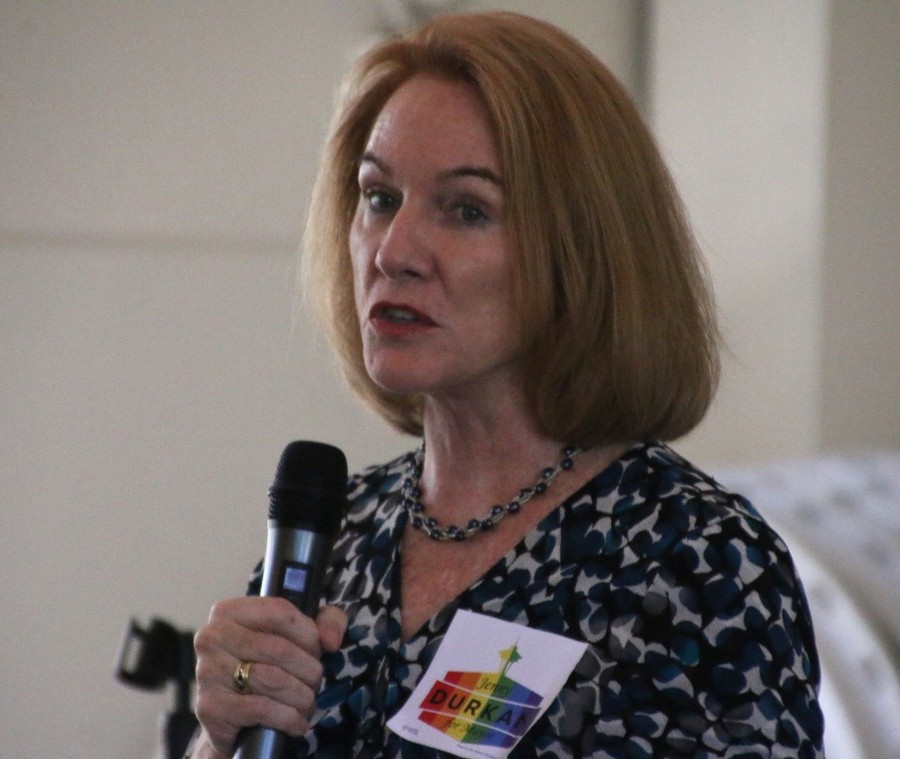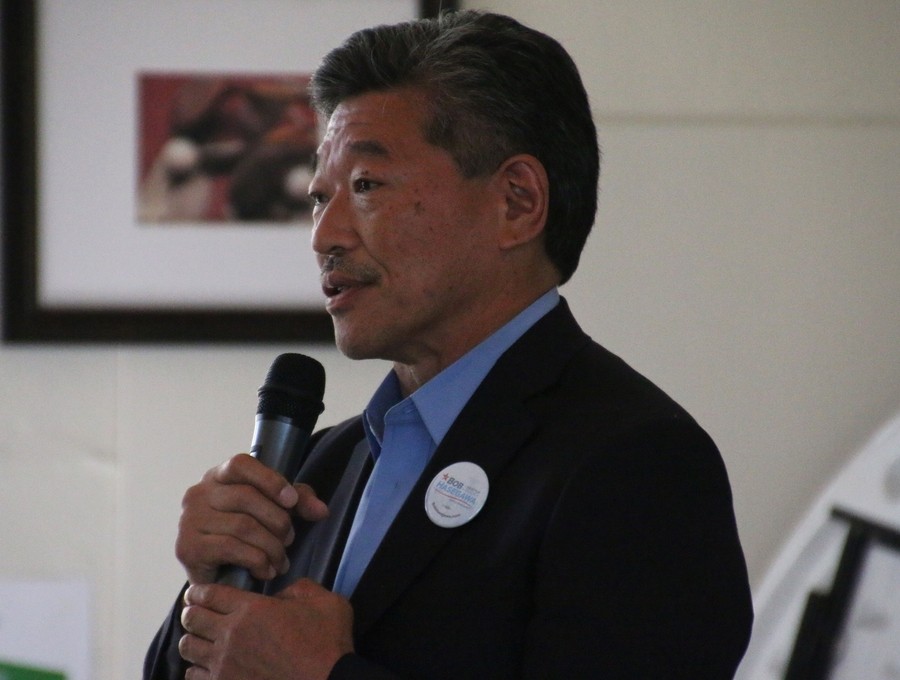By Tracy Record
West Seattle Blog editor
With less than three weeks remaining until King County Elections mails your primary ballot, do you know which of the 21 mayoral candidates you’re voting for?
We’re covering all the West Seattle forums, including the latest one presented today by the West Seattle Democratic Women, during their monthly meeting in the WS Golf Course banquet room.
First, if you’d like to watch/listen, here’s our unedited video of the entire hour-and-a-third forum featuring six candidates:
Ahead, text highlights of what they were asked and how they replied, as voting time approaches:
In first-name alphabetical order, the participants were Sen. Bob Hasegawa, Cary Moon, Jason Roberts, Jenny Durkan, Jessyn Farrell, Mike McGinn. First, opening statements:
Former mayor McGinn spoke first. “I was mayor before, watching what was going on in our city, and had concerns … (particularly) rents and housing prices going up … it was forcing people out, forcing people out who were here already, meant we wouldn’t be the type of place people could come to and make a life …” He mentioned the “regressive tax system… in a time of extraordinary growth in the city … we are flush with money.” He said he would use his budget experience and “reprioritize our (money) to what matters. … (Also) the ones who are benefiting from the growth should help pay for the growth.”
Next, Moon, saying she’s “running for mayor because I believe in Seattle’s potential,” but its success for some “is a party that people feel they weren’t invited to.” She also called out “the housing-affordability issue” as a key problem, as well as homelessness, and said she has the answers, and reiterated that Seattle should be “the North Star vision” in a time of disarray in other government centers such as Washington, D.C. and Olympia.
Third, Roberts, “a small business owner and a consultant,” who said he is “not satisfied with the direction in which our city government has gone.” He also called out the dissonance between the city’s wealth and the city’s huge homelessness situation. “I got involved because I think it’s time the city take accountability for the problem it helped create.” He wants to see money get directly to people who need help “instead of lost in focus groups and consultants and studies.”
Fourth, former state Rep. Farrell, who summarized her background as a lawyer, former legislator, nonprofit director, and UW graduate. “I’m running for mayor because there is a lot of pain in this city, around affordability, equity, transportation … I believe that housing is a human right and to address homelessness we have to address housing affordability as well as mental-health issues.” She also said light rail should be delivered faster, that the city should be a climate leader, and should be “a partner with public schools,” and should continue “the tough work of police reform,” giving a mention to the Charleena Lyles case though not saying her name.
Fifth, former U.S. Attorney Durkan said she’s running because she’s a Seattle native and loves the city. She mentioned the federal government and that we have to be sure that it “does not impose its wrong values on the Northwest.” Prosperity here has “come with real challenges,” she echoed, particularly housing affordability. Regarding transportation, “we have to fix the connectivity between West Seattle and downtown,” maybe getting light rail here sooner. Our challenges, unlike other cities, “are not unsolvable,” she declared.
Finally, Sen. Hasegawa said he “come(s) out of the social-justice movement” and said he’s very familiar with “south-end issues.” He declared that he could “manage transformational change” and restore the connection between the mayor’s office and neighborhoods/communities. He would re-empower the neighborhood councils with which Mayor Murray cut ties. And he said he has the “only fiscal solution that I can see” – a public bank.
Then moderator Rachel Glass, the WSDW’s chair, asked the same question to all six candidates: “Many people in Seattle and all over the world have looked to our leaders to take bold progressive action to protect (people).” Attorney General Bob Ferguson‘s legal action, the City Council’s $15 wage law, and more. “What is an example of a big bold idea you will fight to implement?”
First, Farrell: Child care. The Seattle “affordability crisis” is not just about housing, she noted, it’s also about child care. “As mayor I would love to support the idea and policies to support the idea that no family should pay more than 10 percent (of their income) for child care.” She also said the next Families and Education Levy should support more child-care options and secure, stable incomes for providers. “Finally, I would love to work with private employers” on possibilities such as vouchers for child care.
Second, Durkan, who mentioned wage disparities: “The good-paying jobs just aren’t there” for young workers. “I’d like to put together and expand an apprenticeship program” to give training and experience to youth, particularly those for whom college might not be the right path. Construction workers, police, fire, retail are all fields for which people could be trained.
Third, Hasegawa: “We have to bring democracy back to our city. … What we really need to do is empower the people so we win these victories for ourselves.” And his big idea, the public bank. “What we need to do is to create the capacity to self-finance … the type of construction necessary” for public housing, schools, sidewalks. “That is the structural one big deal I would like to see.”
Fourth, McGinn: “As mayor, we were the first city in the country to divest from fossil fuels,” and he talked about municipal broadband (which hasn’t happened yet) – “We’ve had a lot of big ideas, I’m just concerned about the followthrough on these … We need to take a lot of actions. We still haven’t divested from fossil fuels in our pension fund.” And he mentioned the need for “portable benefits” because of “the gig economy.” He would also like “to dig back into municipal broadband and actually do it.”
Fifth, Moon: She emphasized that the affordable-housing crisis is what got her into this race. She said she’d been working on solutions for problems “for decades.” She said the crisis isn’t the fault of people moving here, but people buying our housing stock for investment and speculation. She would change policies to make that harder to do. “We need to be building affordable housing at 10 times the rate we are now.”
Finally, Roberts: “Some of the big ideas are conversations that the city needs to start engaging in with Olympia.” He would rather see tax reform on a statewide level, not just local as is being discussed now. Plus, he said, rent control is a big idea – he’s not entirely for it, though.
Next section had candidates drawing questions from a bag full of them.
First, Hasegawa. The question had to do with a city income tax – do you support it and if so or not, what specific steps will you take to everyone pay their fair share?
He said he was a longtime proponent of “comprehensive tax reform” in the Legislature and has sponsored bills to that effect. He pointed out that B&O tax on businesses is just as regressive … “a public bank should be part of this conversation because it will generate revenue for the people without raising taxes.” Changing the law is necessary, and he said he has a “strong” record of supporting that.
Durkan drew the question: “When Trump pulled the US out of the Paris accord, many mayors vowed to stay in … and take local action. If elected, will you stand with the other US mayors (who did)?”
“Damn straight,” she began. “Absolutely.” And then she veered off the topic to tell the story of going to Sea-Tac Airport the day of the first travel ban. She vowed to take dramatic action on climate change too, while looking “at the social-equity issues.” For example, she said, moving toward more electric vehicles would be the right thing to do but many areas of the city don’t have charging facilities and people don’t have vehicles where they can charge at home.
Farrell’s question was about state education financing’s shortfall, so how will the city work to support schools? She said that she’s “been on the front lines” in the Legislature for several years. “There will be some solutions this year,” but it will still fall short. “Our City Hall has to be a partner to meet the needs of every single kid in the city,” helping to close the opportunity gap – one way to do that would be helping to fund summer school so there are equitable opportunities in the summertime. The city also could step in by helping with resources like nurses in schools. “Housing matters” too, she said.
Roberts’ question: How will you work with the City Council to be sure the city will continue to support livable wages, and do you think the $15 law can be improved on?
He replied that as a small-business owner, he supports the law, but “$15 isn’t a livable wage in this city … To move forward on this, we really have to focus on the wage disparity we have.” He thought working with big companies such as Amazon and Microsoft could lead to retraining of workers rather than importing new ones. Also helping subsidize transit for workers would be one idea.
For Moon, “if elected mayor, what specific steps will you take to work with council, developers, landlords, others” to ease the affordable-housing problem? “We haven’t done a very good job talking about homelessness in our city … we need to understand the root causes … we’re creating the problem … by disinvesting in social services … we need to (figure out how to) get services re-funded.” And, “we need to invest in more low-barrier shelters.”
For McGinn, “incidents of Islamophobia have spiked since Trump was elected … how will you … stand against Islamophobia and other hate crimes?”
McGinn said, “It’s hard to describe the level of fear and anxiety” that’s being felt by Muslims and others including immigrants and people of color. “Even just random stuff on the street.” And, he mentioned “bureaucratic involvement” via ICE, or “people who might turn you in.” People are worried about reporting these “because they don’t know what will happen next.” Speaking up and “establishing norms” is important. “They’re our neighbors and we will not stand for this.” City government, meantime, “has to be a trusted ally.” And it needs to fight “laws that will break up families.”
Next round: More random questions.
First, Roberts: Mayor Murray vowed to keep Seattle “a sanctuary city/freedom city” – what will you do if elected mayor to keep people from being profiled by (federal agents, etc.)?
He said Seattle would remain a sanctuary city and “would not change anything we are doing now” so people know “it’s safe to call the police when you have issues.” He suggested that religious and cultural differences be taught in school, so people know more about other cultures and beliefs.
For Moon: Drug addiction and mental health problems are growing in Seattle … What actionable steps will you take to create services to help those in need?
Moon said that overdose is a top cause of death, and is a “death of despair” because people are being told they’re not cared about. “These are problems that are bigger than Seattle but there are a few things we can do … look at all the services we do have, where we can tighten up and create more money for programs, less for bureaucracy …” She said the city budget and staff have swollen and should be examined to find funding. And the people who are dealing with those in crisis are not being paid well enough.
For McGinn: How will he create a friendly environment for workers and labor unions in Seattle?
“I have been a supporter of unions,” he said, and brought up the Whole Foods/Whittaker street-vacation controversy during his term (when he wanted SDOT to turn down the vacation because WF would be non-union). “Whenever we’re using city resources … we need to look at how we’re going to be sure those dollars are supporting good wages for the people participating in that.” Including a new arena, he said.
For Hasegawa: “There are too many cars on the road in Seattle,” so how will he implement more mass-transit options?
He mentioned first that “Freight mobility suffers when traffic gets gummed up … we have to make sure freight is able to move as well as people. Transit has been a boondoggle for so long,” and agencies don’t coordinate well. Too many decisions are being made “without the people’s input.”
For Durkan: How do you see the problem of homelessness being solved and what actions will you take?
“First thing we have to understand is (dealing) with respect and compassion with people living on the street. These are people in crisis … People wind up on the street for different reasons. … We have to address the problems that brought them to the street.” She mentioned “mothers and children … living in cars” and promised “to drive resources (to them)” because “(the children) are our future.” Move them to low-barrier temporary situations and then housing: “They have to have a home.” She also said the county and city have to work together on providing services and housing, rather than operating in silos.
For Farrell: The city was shocked and saddened by the killing of Charleena Lyles. If elected mayor, how would you work with Seattle Police to be sure the relationship between police and citizens are based on respect, trust, reliability so this wouldn’t be happen?
She replied that it was a tragedy that she was shot dead in front of her children and that we all should be soul-searching about that. “With respect to the police force and what needs to happen next … the work and progress that’s been made around de-escalation is simply not enough.” She envisioned several steps: “Where there are issues around mental health … we need to make sure mental health practitioners are engaged, and at the scene … We need to make sure our police have the right training … more is needed around that, and around de-escalation techniques.” She also said it’s important to recruit more people from communities of color and immigrant communities, and that the laws may need to change.
Final section of the forum: Two questions from the audience.
First one: Would you acknowledge a debt to the Duwamish Tribe, given the damage done to their historic lands, salmon habitat (the questioner mentioned a dam on Longfellow Creek in the golf course area), etc.?
McGinn: “The debt is deep.” And he mentioned the Duwamish River pollution. “The debt we owe to future generations is huge.”
Moon: “Yes,” and she mentioned the importance of opening meetings by acknowledging that we are on historic Duwamish land. “This culture of sharing power across race/class/gender identity is something we need to talk about … it’s essential to plan the future that we want.” She promised a balanced administration.
Roberts: “Absolutely – the debt we owe is great … the damage is severe …” Rebuilding salmon runs is vital, he said, explaining that he’s a fisherman, and that the pink-salmon runs have been depleted. “That’s a big red flag, and we need to do whatever we can to repair the environmental damage that we’ve done to the Duwamish.”
Farrell: “There’s a deep debt that we need to pay,” and the city budget needs to reflect that. She mentioned a state price tag on fixing culverts, affecting tribal-treaty rights. “It is incumbent on us to work with industries and hold companies accountable … to be sure the food people are fishing for is safe for consumption.”
Durkan: “Absolutely.” She said she enjoyed working with tribes in her US Attorney job. “We have much we can learn from our tribal friends.”
Hasegawa: He said he was a leader on working on treaty rights as a state legislator. He also said it’s important to hold the federal government accountable for cleanup.
Final question from the audience: Small businesses in Seattle are at risk. What would you do as mayor to support and sustain and increase the number of small businesses in Seattle?
Farrell: While things such as $15 wages “are absolutely the right things to do,” that has increased costs for businesses. Reducing B&O tax costs could help, and rental costs too.
Durkan: She said she’s been trying to do walking tours in small-business districts around the city. “One of the things we have to look for is the ability for the mayor to give property-tax exemptions for certain classes of businesses, and affordable housing.”
Hasegawa: Commercial rent control through an increase in public housing with ground-floor commercial space could help. He also supports technical support for businesses “so they understand what it takes to grow their business” and low-interest lending for them.
Roberts: Tax reductions, subsidizing, would be “an immense improvement.” City government should have a small-business department to help and encourage businesses.
Moon: We need an economic-development strategy focused on small local businesses. “And we need technical assistance,” since it’s “hard to navigate” all the added regulations.
McGinn: You have to hear from the neighborhoods themselves what’s important to them. He mentioned launching the Only in Seattle program and an increased exemption for small businesses, while increasing the rate for large ones. He also thought an inventory, “to know what you have first,” would be good. What if Pike Place Market, small stalls for businesses, could inspire similar spaces in other neighborhoods?
Glass wrapped up by saying, “I think we’re going to have some tough choices to make.”
The official primary-election date is August 1st, but King County will mail ballots on July 12th.









| 17 COMMENTS